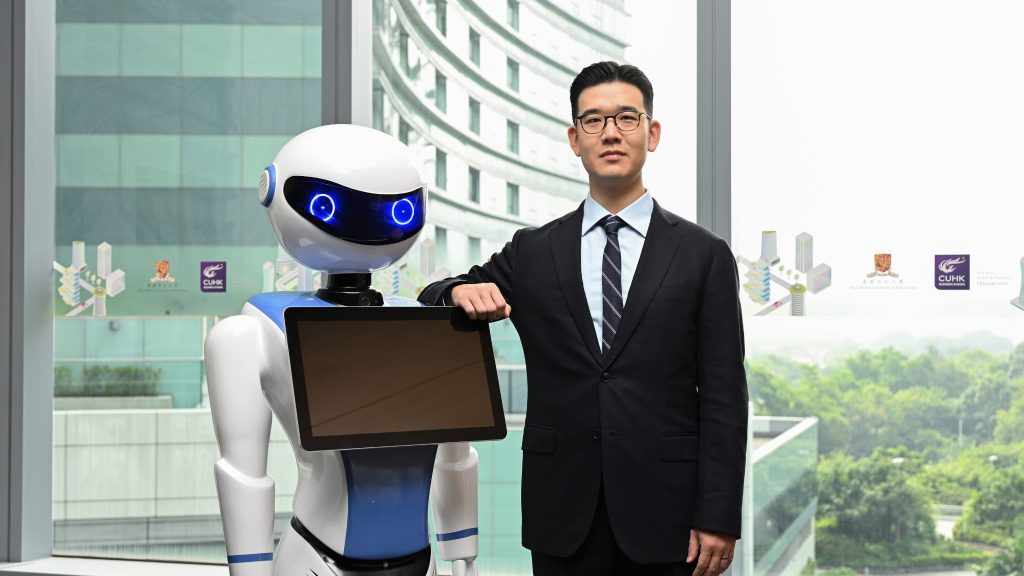AI and robots enhance personalised services and human touch in hospitality at CUHK Business School

AI and robots enhance personalised services and human touch in hospitality at CUHK Business School
AI and robotics are transforming workplaces across
the globe. In China, following DeepSeek AI’s announcement of the DeepSeek R1,
which rattled tech sector worldwide, UBTech, a Chinese robotics manufacturer, aims
to mass-produce AI-enabled industrial humanoid robots capable of assisting with
domestic chores by the end of 2025. In the US, robotics startup Skild AI could achieve
a valuation of US$4 billion if SoftBank leads its $500 million funding round. Skild AI is
developing a scalable foundation model for robotics, allowing machines to interact with
humans safely and dexterously.
These tech developments lead to increased concerns about job displacement. Some
argue that while technology enhances roles for certain workers, it may displace
others. For example, a PwC study predicts that 21 percent of existing jobs in China’s
service sector could be displaced by 2038. In the hospitality sector, another study
estimates that robots could replace up to 25 percent of the global workforce by 2030.
Despite these concerns, the hospitality industry appears to welcome new
technologies. AI and robotics are seen as viable solutions for the sector’s prolonged
manpower shortage, especially having demonstrated their effectiveness during the
global pandemic.
A harmonious partnership between technology, integrated through a customer and
human-centric approach, and employees will streamline operations without
sacrificing the personal touch essential for exceptional hospitality services, believes
Professor Sungwoo Choi, Assistant Professor at the School of Hotel and Tourism
Management at the Chinese University of Hong Kong (CUHK) Business School.
Tech helps unleash human potential
The hospitality market has grown significantly in recent years, projected to reach
US$5,816.66 billion by 2027, at a compound annual growth rate of 6.2 percent.
Despite these positive prospects, the sector has struggled with attracting and
retaining high-calibre employees, with a global turnover rate between 30 and 73
percent, compared to just 12 and 15 percent in other industries.
Professor Choi notes that hotels and restaurants face difficulties in filling frontline
positions. The younger generation often lacks interest in mundane jobs. “From the
employers’ perspective, there are not enough people willing to do frontline hospitality
work because it’s very physically and emotionally demanding,” he says. “AI and
robotics have become the perfect solution to the labour shortage problem.”
Many entering the hospitality industry envision a career focused on making guests
happy. However, as newcomers progress, they often find themselves dealing with
repetitive, mundane, and sometimes taxing tasks behind every guest’s smile. With AI
and robots becoming more prevalent, their idealistic dreams may become reality.
By adopting a well-balanced, human-centric approach to integration, technologies
can improve staff work experience, which will, in turn, enhance guest experience.
Professor Choi highlights that AI and robots are gradually creating new opportunities
by assuming the tedious tasks that originally deterred the younger generation from
entering the hospitality industry. With the help of AI, employees are expected to
streamline operations, better understand guests’ preferences, and tailor their
services to customers’ specific needs. Instead of being bogged down by routine tasks,
hotel staff can feel empowered to curate a superior “home-away-from-home”
experience and high-value services at critical touch point for their guests.
The prospect of having a direct impact on customer satisfaction through exceptional
service has become a pull factor, drawing young people back to the industry. In fact,
a 2018 PwC study estimates a 50 percent growth in jobs for the hotel industry due to
AI and related technology by 2038.
Optimising mix of tech and human touch
Hospitality is fundamentally about personal touch: guests will always value highly
personalised services. Some hotel managers remain hesitant to fully adopt AI due to
concerns over reliability, privacy, and safety.
“As the adoption of AI becomes more extensive and sophisticated, we need to look
at how we can seamlessly integrate any technology with human touch to transform
the guest experience and redefine hospitality,” says Professor Choi.
Traditionally, travellers expect to be greeted by a friendly face and have person-to
person interactions throughout their stay. Given the human-centric, high-touch
nature of the hospitality sector, some travellers may be put off by non-human
service, especially when the state-of-the-art deployment is still in its infancy.
For instance, the Henn na Hotel Tokyo Ginza in Japan, recognised by Guinness
World Records as the first hotel with working robots, was initially staffed largely by
robots. It dismissed half of its robotic staff four years after its launch owing to
numerous complaints about service errors.
“I think most consumers still prefer human service. We’re just hardwired that way.
We seek genuine, authentic interactions rather than programmed responses. We
want to sense warmth, sincerity, and a human touch. It’s difficult to change our
ingrained belief that people are warm, while machines and robots are cold, no matter
how human-like they may appear,” says Professor Choi.
Understanding this consumer psychology can help businesses decide how to
balance machines and human touch to achieve optimal outcomes for different target
segments. For example, business travellers may find a robot-assisted check-in and
check-out process acceptable for a short, no-frills hotel stay. However, a family on
vacation may expect personal attention and caring interactions that make them feel
at home.
At various touch points in the guest experience, hospitality leaders must devise a
strategy that aligns with their brand and seamlessly integrates humans and AI, notes
Professor Choi.
“It’s possible that robots will learn to simulate feelings and even speak with
compassion, but we are wired to sense the coldness of a machine, no matter how
closely it imitates human emotions,” adds Professor Choi. “I don’t think AI will replace
human beings, but as different markets and industries grow more accepting of AI
and technology continues to advance, I can imagine human-like AI being a reality in
the future.”
While benefiting from technology to improve operational efficiency and acquire
customer insights, hotel operators should prioritise designing new products and
delivering personalised services that genuinely connect with guests, winning their
hearts with an authentic human touch where it is most needed, he adds.
The original article was published on the website of CUHK Business School:
https://www.bschool.cuhk.edu.hk/featured-stories/can-ai-make-hospitality-more-human/






